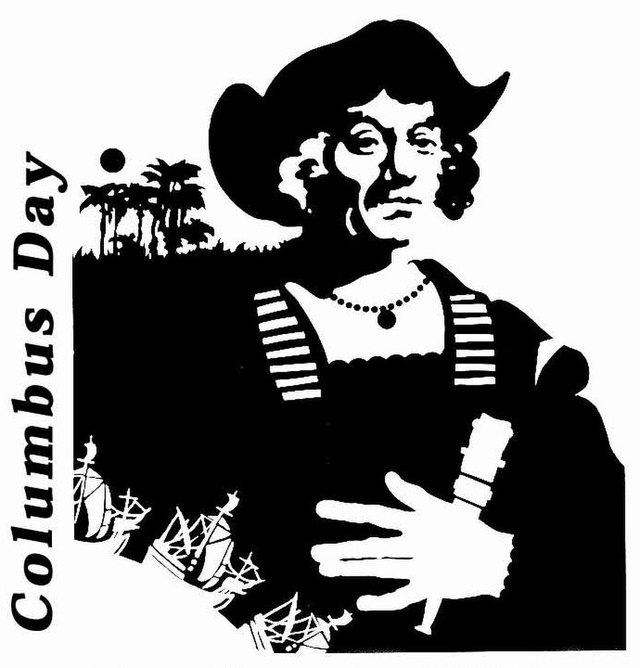
Please Follow us on Gab, Minds, Telegram, Rumble, Truth Social, Gettr, Twitter
Doral, Florida - Christopher Columbus was a great man in world history and worth remembering. He was not the first European to sail across the Atlantic when he did so in 1492. The Vikings had reached North America almost 500 years before. Nevertheless, he opened the door for a cultural exchange among all the peoples on the Atlantic shores.
To start this cultural exchange, he relied on ancient technologies, using wind and solar power adapted to the Atlantic ocean. The Iberian caravel ships that he sailed had higher sides than Mediterranean ships, in order to withstand the higher waves of the ocean, and triangular sails to facilitate sailing against the wind. Columbus was born in Genoa, but moved to Portugal in order to pursue a sailing career on the Atlantic, a more challenging and profitable field. He rose to captain of commercial ships, and had the faith to trust that our Creator had put us in an orderly world, capable of being understood through empirical observation and rational analysis. He was a precursor of the Scientific Revolution that followed in Europe.
The indigenous people of the Americas had migrated from northeast Siberia, walking over the Bering Strait when ocean levels were lower, over 10,000 years before the arrival of Columbus. They had not, however, created a peaceful utopia on their side of the Atlantic. Instead, they built cultures based on cruelty and violence, from: (1) the Iroquois, Comanches and Sioux in North America; to (2) the Maya and Aztecs in Mesoamerica; and down to: (3) the Incas, Guarani and Mapuche in South America.
For example, the Aztec empire was consolidated shortly after the year 1480, before the arrival of Columbus, and they celebrated at the Main Temple (Templo Mayor) in their capital city of Tenochtitlan. During the four days of celebration, over 80,000 captives were sacrificed, having their hearts ripped out with obsidian knives by satanic priests. The cruelty of the Hurons to their prisoners of war was amply chronicled by Jesuit missionaries. Team handball games in Mesoameria were followed by the beheading of the losing captain. Ritual human sacrifice was widespread among the indigenous people of the Americas.
They were also active in human trafficking. For example, when the Cherokee went on their Trail of Tears to Oklahoma, they took with them their African slaves. Slavery was common in pre-Columbian America, and so was cannibalism, including both by the Carib people in the sea named after them. The name “Mohawk” comes from the Algonquin language word for flesh eaters.
The Declaration of Independence of the United States listed among its charges against King George III that he had: “endeavored to bring on the inhabitants of our frontiers, the merciless Indian Savages, whose known rule of warfare is an undistinguished destruction of all ages, sexes and conditions.”
Conquest
Columbus instructed his crew to treat the indigenous people with respect. Nevertheless, the Spanish conquistadores seldom treated the indigenous people with respect. Latin American civilization is founded on violent conquest, rape and extraction. But would the indigenous people have acted any better if they had held the balance of power over the Europeans? Not a chance.
After the voyages of Columbus and the resulting conquest of Cuba, the indigenous Taino people led by their chief Hatuey rebelled against Spanish rule, but were brutally suppressed. Hatuey was tried for insurrection and sentenced to burn at the stake. Before his sentence was executed, a Dominican friar with some knowledge of the indigenousl language relayed to him the good news of the Gospel. The friar assured Hatuey that if he accepted the Christian faith, then he would enjoy eternal life after his sentence was executed. Hatuey asked whether in this eternal life he would find his Spanish conquerors. The friar assured him that they would be there, and upon hearing that, Hatuey rejected Christianity.
‘NO AD’ subscription for CDM! Sign up here and support real investigative journalism and help save the republic!‘
Unfortunately, the Spanish and Portuguese colonies granted a government-enforced monopoly on religious practice to the Roman Catholic Church. We know that monopolies don’t work. Meanwhile, in North America 13 British colonies were founded starting a century after the initial Spanish conquests. These colonies featured diversity of religious denominations competing zealously for adherents, from dissenting Puritans in New England to Anglicans in Virginia, Dutch Reformed in New York, Catholics in Maryland and Quakers in Pennsylvania.
They united in 1776 to proclaim the founding of the American republic, based on objective truth, a benevolent Creator and rights therefrom: “We hold these truths to be self-evident, that all men are created equal, endowed by their Creator with certain inalienable rights.” This republic has become a haven for immigrants from all over the world seeking individual liberty under the rule of law.
Marx versus Columbus
Today Marxist progressives, looking to fundamentally transform America into a totalitarian socialist tyranny, tear down the heroes and achievements of American civilization. This transformation includes replacing Columbus Day with Indigenous People’s Day, as is currently being done by the Miami-Dade County Commissioners. See: https://miamiindependent.com/miami-dade-county-cancels-columbus-day/. This county is a haven for refugees from socialist tyranny not only in Latin America, but also in the Blue States of America. This Marxist vote by the Commissioners shows the disconnect in perspectives and priorities between them and the people that they are supposed to represent. Their vote is not only un-American, but also anti-American.
Marxist historians like Howard Zinn, 1922-2010, maligned Columbus because he opened the door not only to immigration from the Old World to the New World, but also to a new American civilization based on private property and profit. President Ronald Reagan provided a fitting response in a Columbus Day tribute: “Columbus is justly admired as a brilliant navigator, a fearless man of action, a visionary who opened the eyes of the Old World to an entirely New World. Above all, he personifies a view of the world that many see as quintessentially American - - not merely optimistic, but scornful of the very notion of despair.”
Columbus pushed the limits of the frontier, like every American. See Heritage Foundation, The Truth About Columbus, October 6, 2017. He embodied the American virtues of perseverance, entrepreneurship and audacity.
Columbian Exchange
In the “Columbian Exchange” that started in 1492: (1) those indigenous people provided corn (maize), potatoes, tomatoes, avocados, cocoa (chocolate), turkeys, llamas, tobacco and similar items; while (2) the Europeans provided Christianity, written languages, the scientific method, modern technology, the rule of law (up to a point), deadly diseases, horses and other domesticated animals.
So what is there to celebrate, acknowledge or respect about the culture of those indigenous people? Their cruelty? Their ignorance? Their backwardness? They did not even use wheeled vehicles or metal tools. Was their land stolen? How can something be stolen when it is not owned by anyone? Where are the indigenous land-title registries? They had marched into a new landmass that was disconnected from the rest of human civilization, and so they fell far behind in their cultural achievements. Cultural exchange is essential for cultural progress.
Why didn’t they sail to Europe? They could have sailed the Gulfstream from Miami Beach to Cornwall. To celebrate the culture of indigenous people is to celebrate ignorance, cruelty and backwardness. Heck, even most indigenous people don’t want to celebrate that!
Instead, America provides an alternative national identity, regardless of ethnicity, for all comers: “E Pluribus Unum.” By becoming culturally Americans, indigenous people can share in the heroes and achievements of American civilization. Marxists don’t want that, but instead want to fundamentally transform America. American Indians should resist that, and instead celebrate the coming of Columbus. He opened the way for American Indians to hear the good news of the Gospel. That alone is worth the shock of the discovery of the Americas.




















